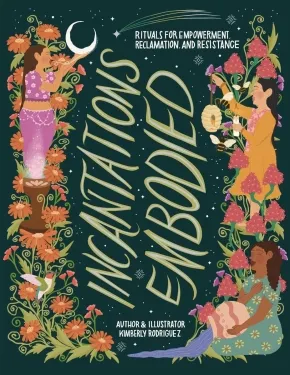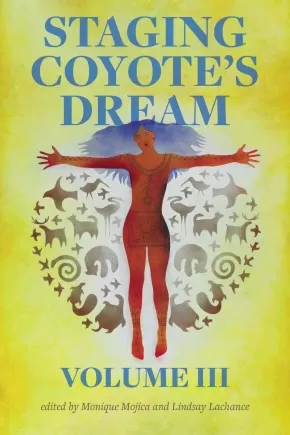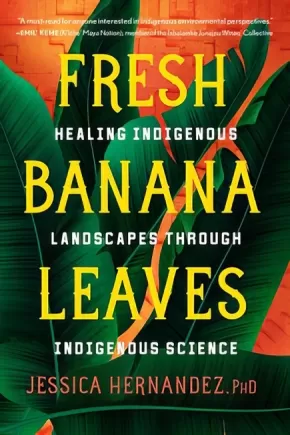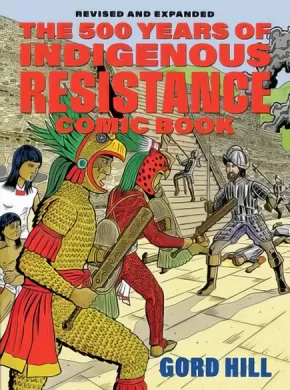
Indigenous Peoples in Central America
1
-
5
of
5 Results;
Sort By
Flourishing Kin: Indigenous Wisdom for Collective Well-Being
$26.99
Format:
Paperback
Text Content Territories:
Indigenous;
Reading Level: N/A
ISBN / Barcode: 9781649632043
Synopsis:
Synopsis:
From Indigenous scholar Yuria Celidwen comes a first-of-its-kind book about our aspiration for sustainable, collective flourishing through Indigenous wisdom, traditions, and practices that bridge Indigenous and Western knowledges and ways.
How do we cultivate happiness? When facing the monumental challenges of our world, we often end up disconnecting in order to focus on our mental health. Dr. Yuria Celidwen explains this focus on our own state of mind alone is precisely why so many of us struggle to flourish. “What’s been overlooked is the Indigenous perspective of relationality,” she says. “It is the understanding that happiness is only possible in community, when we cultivate our relationships toward all kin, from human to more-than-human, and to our living Earth.”
Dr. Celidwen’s research shows the tremendous benefit of integrating Indigenous approaches into our approach to well-being, while recognizing the gains made by Western positive psychology, mindfulness, and neuroscience. In Flourishing Kin, she identifies seven key principles found in Indigenous cultures worldwide that embrace virtue, ethical living, and spirituality. Each principle—Kin Relationality, Body Seed, Senshine, Heartfelt Wisdom, Ecological Belonging, Collective Well-Being, and Reemergence—is a seed to flourishing kin, and reveals how we can overcome isolation and climate anxiety, nourish healthy relationships with our communities and environment, and build strong foundations of well-being that elevate our life choices for the benefit of our whole planet.
Sustainable collective flourishing goes beyond optimism or resilience. Offering opportunities for exploration, reflection, and personalized insight, here you’ll find shared storytelling, cultural tradition, and other forms of enhanced contemplative practice like ritual, music, movement, and art to support your journey. Through poetic expression and authentic truth telling, Dr. Celidwen invites us to experience a path to fulfillment that allows us to meet the world in all its complexity with reverence and joyous commitment to participate in the flourishing of all living beings.
Additional Information
256 pages | 6.05" x 8.95" | Paperback
Incantations Embodied: Rituals for Empowerment, Reclamation, and Resistance
$23.99
Text Content Territories:
Indigenous; Indigenous Peoples in Mexico;
Reading Level: N/A
ISBN / Barcode: 9781955905558
Synopsis:
Synopsis:
Kimberly Rodriguez, a first-generation Xicana Indigena artist, poet, and activist, invites readers on a transformative journey of self-discovery and empowerment through her book, Incantations Embodied: Rituals for empowerment, reclamation, and resistance, serving as a catalyst for reclaiming our stories, truth, and power.
In Incantations Embodied: Rituals for Empowerment, Reclamation, and Resistance, author Kimberly Rodriuguez takes readers on a profound and transformative journey towards self-discovery and empowerment. Within its pages lies a poignant exploration of the human experience, interwoven with elements of spirituality, healing, and personal growth.
At its core, Incantations Embodied serves as a triumphant homecoming—a return to the essence of one's being. It invites readers to embark on a sacred journey, emboldening them to embrace their true selves with unwavering honesty and compassion.
Through Rodriguez's captivating stories, enlightening prose, and enchanting rituals, this book becomes a powerful catalyst for reclaiming our stories, our bodies, our identities, our voices, and ultimately, our power.
In a world where societal norms and expectations often stifle individuality and self-expression, Incantations Embodied stands as a resounding call to break free from these chains. It seeks to dismantle the oppressive narrative that has been ingrained in our collective consciousness, urging us to question and challenge the colonized structures that have kept us disconnected from our own truth.
The book serves as a powerful guide for self-realization, urging individuals to transcend their limitations and embrace their innate potential. With each turn of the page, a profound shift occurs—a blossoming of self-awareness, strength, and resilience.
"Incantations are our liberation. With the power of words, we become conjurers, bringing our wildest dreams to life." - Kimberly Rodriguez
Additional Information
180 pages | 6.00" x 9.00" | Paperback
Staging Coyote's Dream Volume 3
$34.95
Format:
Paperback
Text Content Territories:
Indigenous American; Indigenous Canadian;
Reading Level: N/A
ISBN / Barcode: 9780369104748
Synopsis:
Synopsis:
On the twentieth anniversary of its first volume, Staging Coyote’s Dream Volume 3 is a curated collection of new works rooted in Indigenous values, aesthetics, and narrative structures. Inspired by their own dramaturgical practices and current conversations in contemporary theatre creation, co-editors Monique Mojica and Lindsay Lachance identify the invaluable and understudied ways that many Indigenous theatre artists are creating culturally specific dramaturgical processes and shifting the paradigm for what is considered “text.” By presenting models for relational theatre-making and land-based explorations outside the traditional “well-made-play” structure, Staging Coyote’s Dream Volume 3 is more than just a collection of plays; it offers some strategies and tools for how Indigenous artists can reimagine the structures of new-play development and performance on Turtle Island.
An anthology that identifies and highlights a vast array of anti-colonial performing arts processes, including reclamation, embodiment, and community-engaged work—to name only a few—Mojica and Lachance gather the works of artists leading these practices to not only honour how their plays are expanding dramaturgy, but to build Indigenous performance literacies for all practitioners creating on Turtle Island.
Additional Information
416 pages | 6.00" x 9.00" | Paperback
Fresh Banana Leaves: Healing Indigenous Landscapes through Indigenous Science
$23.95
Format:
Paperback
Text Content Territories:
Indigenous Central American; Indigenous Peoples in El Salvador; Maya; Maya Ch'orti' ; Indigenous Peoples in Mexico; Zapotec; Indigenous American;
Reading Level: N/A
ISBN / Barcode: 9781623176051
Synopsis:
Synopsis:
An Indigenous environmental scientist breaks down why western conservationism isn't working--and offers Indigenous models informed by case studies, personal stories, and family histories that center the voices of Latin American women and land protectors.
Despite the undeniable fact that Indigenous communities are among the most affected by climate devastation, Indigenous science is nowhere to be found in mainstream environmental policy or discourse. And while holistic land, water, and forest management practices born from millennia of Indigenous knowledge systems have much to teach all of us, Indigenous science has long been ignored, otherized, or perceived as "soft"--the product of a systematic, centuries-long campaign of racism, colonialism, extractive capitalism, and delegitimization.
Here, Jessica Hernandez--Maya Ch'orti' and Zapotec environmental scientist and founder of environmental agency Piña Soul--introduces and contextualizes Indigenous environmental knowledge and proposes a vision of land stewardship that heals rather than displaces, that generates rather than destroys. She breaks down the failures of western-defined conservatism and shares alternatives, citing the restoration work of urban Indigenous people in Seattle; her family's fight against ecoterrorism in Latin America; and holistic land management approaches of Indigenous groups across the continent.
Through case studies, historical overviews, and stories that center the voices and lived experiences of Indigenous Latin American women and land protectors, Hernandez makes the case that if we're to recover the health of our planet--for everyone--we need to stop the eco-colonialism ravaging Indigenous lands and restore our relationship with Earth to one of harmony and respect.
Despite the undeniable fact that Indigenous communities are among the most affected by climate devastation, Indigenous science is nowhere to be found in mainstream environmental policy or discourse. And while holistic land, water, and forest management practices born from millennia of Indigenous knowledge systems have much to teach all of us, Indigenous science has long been ignored, otherized, or perceived as "soft"--the product of a systematic, centuries-long campaign of racism, colonialism, extractive capitalism, and delegitimization.
Here, Jessica Hernandez--Maya Ch'orti' and Zapotec environmental scientist and founder of environmental agency Piña Soul--introduces and contextualizes Indigenous environmental knowledge and proposes a vision of land stewardship that heals rather than displaces, that generates rather than destroys. She breaks down the failures of western-defined conservatism and shares alternatives, citing the restoration work of urban Indigenous people in Seattle; her family's fight against ecoterrorism in Latin America; and holistic land management approaches of Indigenous groups across the continent.
Through case studies, historical overviews, and stories that center the voices and lived experiences of Indigenous Latin American women and land protectors, Hernandez makes the case that if we're to recover the health of our planet--for everyone--we need to stop the eco-colonialism ravaging Indigenous lands and restore our relationship with Earth to one of harmony and respect.
Reviews
"Westerners, [Dr. Hernandez] writes, fall short on including Indigenous people in environmental dialogues and deny them the social and economic resources necessary to recover from 'land theft, cultural loss, and genocide' and to prepare for the future effects of climate change."—Publishers Weekly
"Westerners, [Dr. Hernandez] writes, fall short on including Indigenous people in environmental dialogues and deny them the social and economic resources necessary to recover from 'land theft, cultural loss, and genocide' and to prepare for the future effects of climate change."—Publishers Weekly
“In Fresh Banana Leaves, Jessica Hernandez weaves personal, historical, and environmental narratives to offer us a passionate and powerful call to increase our awareness and to take responsibility for caring for Mother Earth. A must-read for anyone interested in Indigenous environmental perspectives.”—EMIL’ KEME (K’iche’Maya Nation), member of the Ixbalamke Junajpu Winaq’ Collective
Additional Information
256 pages | 6.00" x 9.00" | Black and white illustrations | Paperback
256 pages | 6.00" x 9.00" | Black and white illustrations | Paperback
The 500 Years of Indigenous Resistance Comic Book: Revised and Expanded
$21.95
Artists:
Format:
Paperback
Text Content Territories:
Indigenous American; Indigenous Canadian; Indigenous Central American; Indigenous South American;
ISBN / Barcode: 9781551528526
Synopsis:
Synopsis:
A new and expanded version of Gord Hill's seminal illustrated history of Indigenous struggles in the Americas. When it was first published in 2010, The 500 Years of Resistance Comic Book was heralded as a groundbreaking illustrated history of Indigenous activism and resistance in the Americas over the previous 500 years, from contact to present day. Eleven years later, author and artist Gord Hill has revised and expanded the book, which is now available in colour for the first time.
The 500 Years of Indigenous Resistance Comic Book powerfully portrays flashpoints in history when Indigenous peoples have risen up and fought back against colonizers and other oppressors. Events depicted include the the Spanish conquest of the Aztec, Mayan and Inca empires; the 1680 Pueblo Revolt in New Mexico; the Battle of Wounded Knee in 1890; the resistance of the Great Plains peoples in the 19th century; and more recently, the Idle No More protests supporting Indigenous sovereignty and rights in 2012 and 2013, and the resistance to the Dakota Access Pipeline in 2016. Canadian events depicted include the Oka crisis in 1990, the Grand River land dispute between Six Nations and the Government of Canada in 2006, and the Wet'suwet'en anti-pipeline protests in 2020.
With strong, plain language and evocative illustrations, this revised and expanded edition of The 500 Years of Indigenous Resistance Comic Book reveals the tenacity and perseverance of Indigenous peoples as they endured 500-plus years of genocide, massacre, torture, rape, displacement, and assimilation: a necessary antidote to conventional histories of the Americas.
The book includes a foreword by Pamela Palmater, a Mi'kmaq lawyer, professor, and political commentator.
Reviews
"Gord Hill's goal of giving indigenous peoples a better understanding of their past so as to counter the benign version all too often taught in schools and presented in the media makes the format [of his work] the perfect vehicle for his hard-hitting message."-BC Studies
"Gord Hill has put colonial myth-makers on notice with a comic that educates and inspires." - The St'at'imc Runner
"Comics aren't always known for treating serious subjects, but Gord Hill's The 500 Years of Resistance Comic Book adds a dose of reality to the genre. Hill, of the Kwakwaka'wakw nation, has taken the topics of dispossession, genocide, and the colonization of First Nations in the western hemisphere and, surprisingly, pulled off a rendering in comic book form." -Dissident Voice
"Never before have I come across a non-fiction graphic novel capable of evoking such a powerful emotional response. Dealing with such topics as genocide, oppression and assimilation the comic is sure to cause frustration and sadness in the reader. At the same time, 500 Years of Resistance is inspirational and empowering, accurately depicting the strength and nobility of Native warriors. Gord's straightforward approach to writing coupled with his iconic illustrations has created a truly groundbreaking comic book." -Redwire Media
"An excellent introduction to the tremendous historical and ongoing legacy of resistance on the part of Indigenous peoples in Canada and elsewhere in the continent against the settler colonial regimes that continue to oppress and exploit." -Popmatters. com
Educator Information
This book is available in French: 500 ans de résistance autochtone
Additional Information
144 pages | 9.00" x 12.00" | Comic Book | Colour Illustrations Throughout
Sort By











